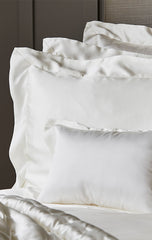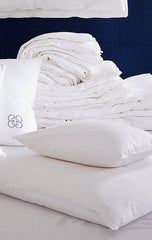How to Tame Frizzy Hair in Five Steps
Unpredictable and utterly unruly, failing to control frizzy hair is as common as it is inconvenient. One of the leading causes of bad hair days, keeping your locks smooth, glossy and flyaway free from summer through to winter is an undeniably uphill battle. However, if you're looking for effective, natural ways to tame the untamable, the team here at Gingerlily can help.
In this post, we’ll be sharing our top five favourite home remedies for dry and frizzy hair to help you get your locks under control. From how you wash and dry your hair, to what grooming and styling techniques you use, we’ll be rooting out the worst frizz-generating habits in your hair care routine and suggesting healthy alternatives that will strengthen, hydrate and smooth out your stressed hair.
What causes hair frizzing?
A sign of distress, frizz is a common symptom of dry and damaged hair. This dehydration can be caused by a wide range of environmental factors, including the heat and humidity of summer, the rough wind and rain of winter and poor hair care, but it can also be unavoidably coded into your DNA. Other than your hair care routine, which can be altered to reduce damage, these dehydrating influences are practically impossible to avoid, but their effects can still be protected against.
- Heat and humidity are one of the most common causes of bad hair days, leaving many of us struggling to control our frizzy hair during the warmer months and holidays abroad. Physically, the appearance of frizzy, unruly hair is caused by the swelling and raising of the hair cuticles in moist conditions. The best way of stopping this reaction to moisture in the air is to re-hydrate and re-strengthen your hair’s natural moisture so it doesn’t need to absorb it from the air.
- Wind and rain, an inevitability in Britain, are the main causes of frizzy hair throughout the year, particularly during our annual spring showers and windy winters. A troublesome combination, heavy rains dampen hair and put it into a vulnerable state which, when paired with blustering winds which displace and whip hair around, can cause it to easily snap. Over time, these breakages build up, leaving your hair damaged and dehydrated.
- Poor hair care and styling methods, such as the application of hair dyes, heat-intensive styling, excessive friction and more, are the most easily avoided causes of frizzy hair. The sum total of these habits can range anywhere from a weakening of the hair’s natural defensive barrier to irreparable split ends and breakages, both of which can make your locks more susceptible to frizzy days and untamable flyaways.
- Naturally frizzy. While seasonal weather influences and bad hair care habits are the cause of frizzy hair for many people, for some there is no cause beyond simply genetics, as is often the case for people with naturally curly hair. This is because, since curly hair strands are lifted and curled, moisture produced by the scalp has a harder time spreading the full length of each strand, leaving the hair naturally dehydrated.
How can I tame my frizzy hair naturally?
When trying to control frizzy hair, the main goal isn’t to tackle the symptoms, but to treat the cause. This means that, rather than applying hairspray to hold hairstyles in place or glueing stray hairs down with gel, you should have the dual focus of giving your locks access to the moisture it needs while reducing its exposure to drying and damaging environments. To see long-lasting results, we recommend investing in some key frizzy hair products, including a silk pillowcase, moisturising shampoo and conditioner and a wide-tooth comb, and following our five home remedies for dry and frizzy hair.
Reduce exposure to high temperatures
A seemingly innocent indulgence that many of us use to reduce muscle ache and open up pores, taking scorching showers or soaking in a hot bathtub can have unexpected consequences for your hair. Capable of drying out the scalp and damaging the follicles, avoiding hot showers is an everyday hair care technique that requires minimal effort.
Of course, if hot showers are a necessity you can’t do without, try protecting your hair with a shower cap while the hot water relaxes you and your muscles, then lower the temperature when switching your care focus from your body to your hair. This quick drench of cool water is a good way to get your cuticles close and lay flat, reducing their need for moisture.
Use hydrating shampoos and conditioners
If you’re committed to improving the health of your hair, it’s likely that you’ve already looked into the wide range of shampoos and conditioners available to target the concern of frizz. Often targeted towards certain hair concerns including colour protection, scalp health, and oiliness, those suffering from frizzy hair should consider finding products which are designed to help hydrate and protect. While formulas will change from brand to brand, the best way to ensure you’re getting the best frizzy hair products is to look at the ingredients for glycerine.
A natural humectant, glycerine-rich shampoos work to thoroughly hydrate the hair by absorbing moisture and using it to build a layer of protection around the hair follicle. Pair this with a leave-in conditioning treatment, especially if you shower on a night and leave your hair to dry as you sleep, and your hair’s natural moisture will be locked in.
Allow your hair to dry naturally
Whether you follow our advice and control frizzy hair with blasts of cool water in the shower, or have chosen a shampoo made with glycerine to wash your hair with, one of the most important follow-up care techniques to try is to let your hair dry naturally. The most vulnerable state your hair can be in, wet hair is especially prone to snapping when subject to friction, something which is unavoidable when towel drying. Instead of rubbing your hair with a rough cotton towel, gently pat it dry with a microfibre towel and leave to drip dry.
Sleep on a silk pillowcase
Not unlike the snaps and tangles that towel drying your hair can cause, sleeping on a cotton or polyester pillowcase can have consequences for your hair. Capable of absorbing your hair’s natural moisture and causing split ends from excessive friction, these materials are a poor choice, especially when compared to the silky smooth and naturally non-absorbent alternative of silk pillowcases. At Gingerlily, our 100% mulberry silk pillowcases are gentle on hair and skin, allowing both dry and wet hair to simply glide over the surface instead of tangling and snagging, even if you’re a rolling, restless sleeper.
Avoid harmful grooming and styling techniques
Keeping locks smooth, strong and healthy should be a priority for everyone, but there’s no denying that styling our hair remains equally, if not even more, important to many of us. This is, however, one of the primary causes of frizzy hair, so if you’re concerned about out-of-control flyaways ruining your styled look, here are a few simple swaps you can make to keep them in their place:
- Swap your regular styling hair brush for a wide tooth comb. More bristles cause more friction, which is the main suspect of split ends when combing out tangles and knots, so limiting these will help to reduce damage.
- Avoid styling products with alcohol in them, such as gels and hair spray, as these can dry out the hair, erasing the efforts of any moisturising frizzy hair products.
- Invest in friction-free hair accessories, such as satin or silk scrunchies and silk headbands as these will reduce the risk of snapages throughout the day.
Find luxury silk hair accessories at Gingerlily
Crafted from the finest grade of long strand mulberry silk, the collection of silk pillowcases and hair accessories at Gingerlily are gentle and kind to skin and hair. A favourite way of controlling frizzy hair, our silk essentials for hair are available in a range of colours and sizes to ensure your sleep stays as comfortable as possible, and your daily styling doesn’t cause any damage.
To learn more about how our silk pillowcases and headbands can help protect your hair from dryness and frizziness, read our blog on the benefits of silk protein for hair, or try them out for yourself by browsing our frizzy hair products online at Gingerlily.


